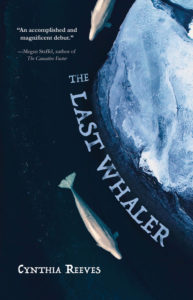 Review by Jane Ward
Review by Jane Ward
Imagine walking along a pier with your children. Your daughter points to something, a bird circling the ocean, perhaps, searching for fish. Your eyes leave your young son for one minute, or less–an instant. When you turn back to smile at him, he is gone. Every parent’s nightmare–that a moment’s lapse can result in a forever tragedy–is the premise that launches Cynthia Reeves’s exquisite novel, The Last Whaler, a tale that unfolds within the world of 20th-century Norwegian whaling, against the backdrop of a relentless and unforgiving Arctic.
In 1937, whaler Tor Handeland and his botanist wife, Astrid, set out for Tor’s whaling station in the Svalbard archipelago at midsummer, a time of great promise–of endless daylight, burgeoning Arctic flora, and Beluga-rich waters. Tor is to join his usual crew of whale hunters, and Astrid wishes to accompany him for the first time to pursue the botany studies she’d set aside when she became a mother. But Tor and Astrid are in personal crisis, their marriage not quite repaired after the accidental drowning death of their second child, Birk. Grief can either unite or isolate, and since the tragedy, Tor and Astrid have become distant. Making the trip together will help heal them, Astrid proclaims over Tor’s protests, and with grave misgivings, he concedes.
Perhaps if, on that evening by the bay, Astrid and I had thought of this precarious balance, this tipping point between the sun’s ascension and declination, we would have felt the undertow that foretold the time to come. (5)
From the outset, Tor seems intent to prove that Astrid should have stayed at home. Her extra baggage only weighs them down; why has she insisted on bringing her heavy wedding dress when they must only bring essentials? He is also aware that her presence unsettles some among the crew. While a few are grateful for the meals she prepares and the civilizing touches she brings to the camp, others, like Tor’s second-in-command, resent that they must watch their mouths and actions around her. Too often, Tor takes the side of his crew members, and his disloyalty emboldens Odd’s increasingly hostile behavior.
When Astrid is not feeding the crew or cleaning up after them, she forages. Her aim is to find new flora to catalog, and this time spent alone pursuing botany is liberating. She is free from those who had labeled her scientific interests as a hobby, and also free from the specter of grief. In those moments, she writes long letters to Birk, sharing with him her joy at her discoveries. “But oh,” she writes, “to be once again pursuing my work!” (88)
Astrid at her most engaged offers the moments of hope in the story. Thus liberated, she unpacks the wedding gown and dons it, tantalizing Tor and reminding him of the love between them. This seduction enchants Tor, and the closeness they find again opens his eyes to his shortcomings. Hoping to make up for his neglect, Tor insists he and Astrid spend two weeks alone after hunting season ends and take a later ship home. Astrid, in the early days of a new pregnancy, agrees, saying nothing about the baby in case Tor decides they must leave.
When dangerous winter weather comes early and violently, Tor and Astrid must abandon plans to reach the ship and instead seek shelter. Unlike the glorious start of their trip at midsummer, winter brings days of oppressive darkness. Isolation, rather than the threat of starvation or childbirth complications, turns out to be the more urgent peril. The birth of Hans in this cold and dark winter overwhelms Astrid, and her unsettled mind becomes fallow ground for despair.
I’ve been useless these past weeks, too weak to help Pappa with the necessary chores. In fact, I haven’t been myself, lost to nightmares, crying uncontrollably at the least provocation. (268)
The novel opens in 1947, ten years after the start of that fateful trip, narrated first by Tor with excerpts from his glemmeboka, or book of remembrance. The second voice is Astrid’s story, gleaned from the cache of letters Tor found among her belongings after he returned home. As both narratives weave together to the novel’s conclusion, they create a clear and poignant picture of a married couple working together to survive, and two individuals suffering from the kind of crushing private guilt that prevents them from being there for each other.
“How did I miss the signs?” Tor writes in one of the last entries in his diary. “Was I too focused on the moments of joy…?” (p. 296) Indeed, what do we all wish we had done differently? What happens when we realize there are outcomes we cannot change? How do we live with regret? In The Last Whaler, Cynthia Reeves suggests an answer: perhaps the best humans can do is to keep on living.
The Last Whaler by Cynthia Reeves
Regal House Publishing, September 2024
Paperback $20.95
ISBN 978-1-64603-508-3
Jane Alessandrini Ward is the author of In the Aftermath (She Writes Press, 2021), The Mosaic Artist (2011) and Hunger (Forge, 2001). She has been a contributing writer for an online regional and seasonal food magazine and a blogger and occasional host of cooking videos for an internet recipe resource. Jane lives in Massachusetts. To learn more, visit janeaward.com.
